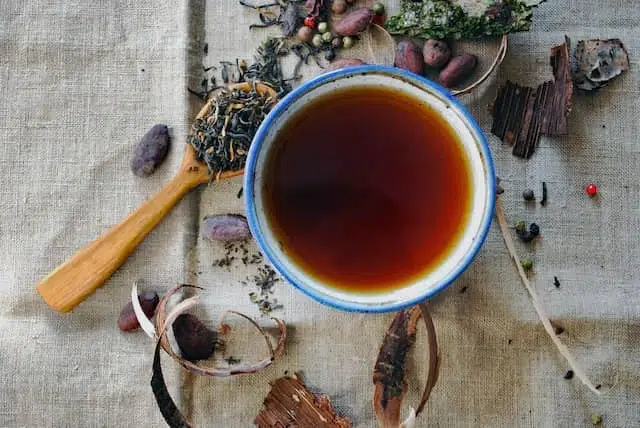Introduction:
Pregnancy is one delicate period in a woman’s life when some old habits have to be put on hold for the safety of her health and baby. One of such may be drinking teas. However, there are some teas to avoid during pregnancy.
On the other hand, there is the conception that herbal teas, being natural, are safe to take during pregnancy for some reasons, including enhancing sleep and inducing labor.
However, some herbal teas are not recommended during pregnancy as they can cause pregnancy complications such as miscarriages, uterine constriction, preterm birth, low birth weight, congenital anomalies, and affect infant developmental growth.
This article is research-based and is focused on highlighting teas that causes miscarriage during pregnancy.
This article explains everything in detail based on in-depth research from clinical studies and review journals.
What is Miscarriage?
Miscarriage is an unexpected loss of a fetus, usually before the 20 weeks of pregnancy but mostly in the first trimester, before 12 weeks or earlier, even before a woman is aware she is pregnant.
In such a case where you may not be aware you are pregnant and need to take a test, there are what not to do before taking a pregnancy test to truly ascertain you are pregnant.
Types of miscarriage include:
- Missed miscarriage: you were not aware of a miscarriage, nor was there a symptom, but an ultrasound scan confirms no heartbeat.
- Complete miscarriage: the fetus is lost, and the womb is empty. You also experience bleeding and passing out of fetal tissue.
- Recurrent miscarriage: repeated miscarriages in every pregnancy, usually two or more in a row. It happens in about 1 in 100 women (1%).
- Threatened miscarriage: this is a complicated pregnancy where you experience bleeding and pelvic cramping but no loss of the fetus. The pregnancy carries to term, but you must be closely monitored until delivery. This is a high-risk pregnancy.
One of the causes of miscarriage includes medication and/or substance use such as some NSAIDs like ibuprofen and diclofenac; smoking, caffeine, or alcohol. (1)
Difference between Miscarriage, Abortion, and Stillbirth
The medical term for a miscarriage is ‘spontaneous abortion,’ but this differs from an ‘abortion’ in its entirety.
While a miscarriage is an undeliberate and unexpected loss of a fetus, abortion is an intended willful act to terminate a pregnancy in its early stages.
On the other hand, a stillbirth (2) is when the loss of pregnancy occurs at or after 20 weeks. Stillbirth is classified into three:
- Early: when it occurs between 20 – 27 weeks of pregnancy
- Late: when it occurs between 28 – 36 weeks of pregnancy
- Term: when it occurs between 37 or more weeks of pregnancy
What are Herbal Teas?

Herbal teas are extracts of plant roots, leaves, bark, buds, berries, or seeds manufactured into teas to serve medical purposes with therapeutic activities.
Some of the commonly used herbal teas include:
- Raspberry leaf tea
- Ginger tea
- Peppermint
- Fennel
Interaction of Herbal Teas with Pregnancy
While some herbal teas are unarguably beneficial health-wise, many have assumed they are safe during pregnancy since they are natural and have been used for centuries in many regions of the world by pregnant women. However, they also pose a risk depending on the type of tea.
As with medicines that interact with the body cells to provide their effect, herbal teas also interact at the molecular level. (3)
As a matter of fact, a fetus in the womb grows fast and experiences rapid cellular development and can be affected when an external reaction occurs, which can affect the growth and lead to complications.
Notwithstanding, there are reports (3) that when herbal teas are consumed in large quantities, a pregnant woman is at risk of complications.
However, it is better safe than sorry. Avoiding some teas during pregnancy is the safest way to prevent complications.
Possible interactions and outcomes herbal teas can have with pregnancy include (4,5):
- Uterine constriction (miscarriage)
- Preterm birth
- Fetal anomaly
- Congenital malformation
- Fetal growth impairment
- Low birth weight
- Herb-drug interactions
For the context of this article, the focus is on teas that causes miscarriage during pregnancy.
Teas That Causes Miscarriage During Pregnancy
The following teas have a high risk of causing miscarriage during pregnancy and other complications and should be avoided as much as possible:
- Chamomile tea
- Licorice tea
- Parsley tea
- Cinnamon tea
- Saffron tea
- Sage tea
- Green tea
1. Chamomile tea (constricted ductus, miscarriage, preterm labor)
Chamomile (German chamomile), a medicinal herb that contains terpenoids and flavonoids, is used to manage muscle spasms and menstrual disorders and is taken as a tea to manage flu.
Chamomile has been reported to result in prenatal constricted ductus arteriosus, a condition that causes right heart failure, fetal hydrops, and fetal loss (miscarriage). (6,7)
Studies have shown that regular use of chamomile results in a higher risk of preterm labor, shorter length of newborns, and low birth weight. (8)
Regular use of chamomile has shown a higher incidence of threatening miscarriages and preterm labor. (5)
Chamomile is also contained in sleepytime tea which is not safe during pregnancy.
2. Licorice tea (miscarriage, stillbirth, and early preterm birth)
Licorice, an herb commonly used to manage colds and coughs, has been reported (10) to cause stillbirth. However, the study requires a broader report (more studies and larger sample size), but a recommendation was still made that licorice be carefully considered before consumption.
The women involved in the study took licorice between the 4th day and 25th week of pregnancy. The rate of stillbirths was recorded higher in women who took licorice than those who did not.
In another study (11), heavy consumption (> or = 500 mg/week) of licorice was associated with preterm delivery (<37 weeks).
While another study (4) reported the same outcome as the other studies at a heavy consumption rate, it also noted that there was “an higher incidence of threatening miscarriages.”
On the other hand, another study (12) outside the scope of prenatal evaluation of licorice, that is postnatal, observed that overexposure (> or = 500 mg/week) to licorice during pregnancy has “detrimental effects on the cognitive performance and psychiatric symptoms in children.”
3. Parsley tea (Abortion-inducing effect)
As reported by a study (13) where pregnant and lactating mothers who were using herbal products were participants, parsley was used as a pain reliever.
Parsley was reported to have “possible abortion-inducing effects” and “should be avoided by pregnant women.”
Other herbal products mentioned in the study that have similar effects include cinnamon, castor, ginger, saffron, and sage.
These herbal products were reported to have a direct influence on pregnancy.
Fenugreek, also mentioned in the study, was reported to cause early delivery and abortion.
However, the study revealed that not many other studies (clinical toxicological reports) were available that report toxicity in some of the herbs mentioned, like sage, ginger, and cinnamon.
4. Cinnamon tea (Abortion-inducing effect)
In the same study above, cinnamon was reported to have abortion-inducing effects. Even though there are insufficient toxicity data on cinnamon, from the study, “women used it to abort the pregnancy.”
5. Saffron tea (Fetal malformation)
The same study above reports that saffron can adversely affect fetal growth and induce several fetal malformations, such as skeletal malformations.
It was also reported among the herbs that can cause miscarriage (induce abortion) during pregnancy.
However, the reports strongly recommend that great caution be taken when saffron is used during pregnancy.
6. Sage tea (Fetal loss)
Sage which can be used for managing cramps, was also mentioned in the same study above that it can induce possible fetal loss.
Even though there are no clinical toxicology data to support the toxicity effect, other studies have been connected to its impact on abortion.
7. Green tea (Fetal ductus arteriosus constriction)
An experimental study (9) (on lambs) to test the hypothesis that intake of green tea in late pregnancy may cause fetal ductus arteriosus constriction (7) was carried out.
It was concluded that exposure to green tea was responsible for signs of constriction of the ductus arteriosus seen in the fetuses of mothers that ingested green tea.
Final Thoughts
While there are studies and reports that some teas can cause complications such as miscarriage, abortion, stillbirth, and other defects, there are not enough toxicological reports to reveal how much is toxic.
However, the available reports show that large amounts of these herbal teas are required to trigger a negative effect on a pregnant woman.
Nonetheless, it is highly recommended that you avoid these teas that can cause miscarriage and use safer alternatives or stay off teas for the period of your pregnancy.
Also, always talk to your doctor and do any research when you want to take any tea during pregnancy.
You may want to read about apple cider vinegar while pregnant which is also recommended not to be taken during pregnancy.
Resources
(1) Causes: What are Abortion and Miscarriage
(2) Stillbirth: What is Stillbirth
(3) Studies on herbal teas: Frequently Used Herbal Teas During Pregnancy,
(4,5) Herbal teas: (4)Use of herbal products among 392 Italian pregnant women: focus on pregnancy outcome, (5)Herbal Medicinal Product Use During Pregnancy and the Postnatal Period
(6,7) Chamomile study 1 & Fetal ductus arteriosus: (6)Premature constriction of the fetal ductus arteriosus, (7) Fetal ductus arteriosus constriction
(8) Chamomile study 2: “Natural” relief of pregnancy
(9) Green tea study: Fetal ductal constriction caused by ingestion of green tea in late pregnancy
(10) Stillbirth from licorice: Fetal and neonatal outcomes in women reporting ingestion of licorice during pregnancy
(11) Preterm delivery: Preterm birth and licorice consumption during pregnancy
(12) Licorice and cognitive outcome: Maternal licorice consumption and detrimental cognitive and psychiatric outcomes in children
(13) Study of herbal products (Parsley): Public Knowledge, Attitude, and Practice on Herbal Remedies Used During Pregnancy and Lactation in West Bank Palestine




